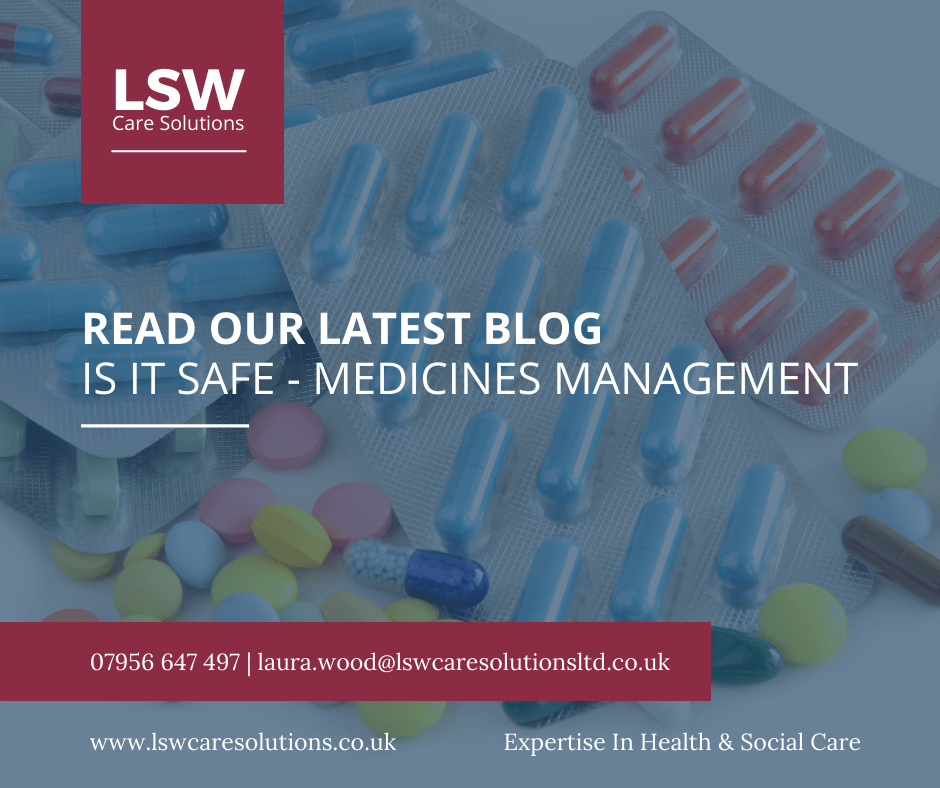- Published: 31/08/2022
- Contains public sector information licensed under the Open Government Licence v3.0.
Over the next few months, we will be exploring the CQC key lines of enquiry by each question and sharing resources we think you might find useful.

How do you as the provider ensure the proper and safe use of medicines?
Applies to services that administer medicines as part of providing regulated activity.
Questions
S4.1 Is the service’s role in relation to medicines clearly defined and described in relevant policies, procedures and training? Is current and relevant professional guidance about the management of medicines followed?
S4.2 How does the service make sure that people receive their medicines (both prescribed and nonprescribed) as intended (including controlled drugs and ‘as required’ medicines), and that this is recorded appropriately?
S4.3 How are medicines ordered, transported, stored, and disposed of safely and securely in ways that meet current and relevant legislation and guidance?
S4.4 Are there clear procedures for giving medicines covertly, in line with the Mental Capacity Act 2005?
S4.5 How does the service make sure that people’s behaviour is not controlled by excessive or inappropriate use of medicines?
S4.6 How do staff assess the level of support a person needs to take their medicines safely, particularly where there are difficulties in communicating, when medicines are being administered covertly, and when undertaking risk enablement assessments designed to promote selfadministration?
S4.7 How does the service engage with healthcare professionals in relation to reviews of medicines at appropriate intervals?
S4.8 How do staff make sure that accurate, up-to-date information about people’s medicines is available when people move between care settings? How do medicines remain available to people when they do so?
Ratings characteristics
- Outstanding
People are protected by a strong, empowering and distinctive approach to safety and a focus on openness, transparency and learning when things go wrong.
- Good
People are protected from avoidable harm and abuse. Legal requirements are met.
The service will always support people to keep themselves and their belongings safe and secure.
- Requires improvement
The service has an inconsistent approach that sometimes puts people’s safety, health or wellbeing at risk. There is an increased risk that people are harmed or there is limited assurance about safety. Regulations may or may not be met.
- Inadequate
A service may have some areas of safe practice, but in general, people are not safe. Normally some regulations are not met.
Potential sources of evidence
People & their carers, friends and relatives:
• Experiences of medicines administration in practice.
• People’s understanding & access to information about their medicines.
• Support for people to look after their own medicines.
• How often medicines are reviewed.
CRM (Customer Relationship Management)
• Share your experience forms.
• Notifications.
• Information of concern enquiries.
Organisations (including pharmacists)
Feedback about:
• Staff and service competence in administering medicines.
• Support to people to look after their own medicines.
• Whether medicines are managed in a person centred way.
• Whether concerns or changes impacting on medicines are communicated appropriately.
• Whether medicines errors or near misses are managed appropriately.
Staff
Feedback about:
• Experiences of medicines training and support.
• Awareness of policies, guidance, procedures, standards and responsibilities in relation to medicines, and whether / how they are applied in practice.
• When and how people are supported to look after their own medicines.
• Access to information about medicines.
• How often medicines are reviewed.
Observation
• Good practice medicines guidance and standards in day to day use.
• Signs of excessive or inappropriate use of medication to control behaviour.
• Storage and disposal arrangements, including for controlled medicines.
Records and policies
• Medicines administration records, including for controlled drugs.
• Medicines review arrangements.
• Medicines training arrangements.
• PRN and other medicines protocols
Does your service need some support with making sure you have the policies, processes, and evidence to respond to the CQC to achieve your desired rating?
Discover how we turnaround failing services, support executives, support managers, and implement our proven health and social care solutions.
LSW Care Solutions and our associates understand the challenges in Health and Social care, but, also know how incredibly rewarding it is to work in this industry every day and improve the lives of people we support.
Our expert associates provide a wide range of solutions from ‘hands-on’ support to the executive level with the ability to work nationally. We work with you to understand your specific needs and design a tailor-made package of support to suit your requirements and budget.

